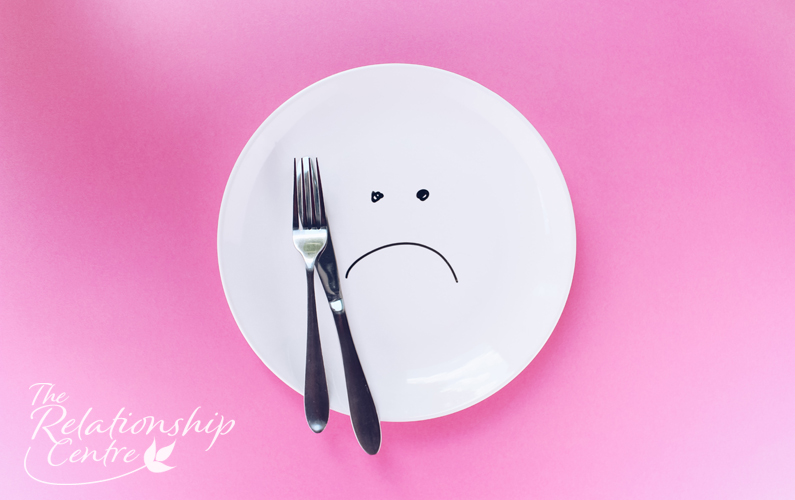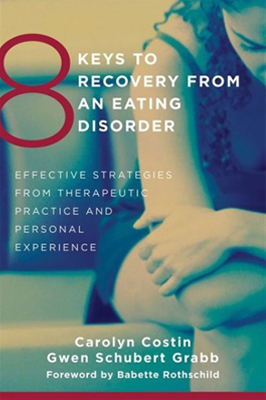Disordered Eating or Eating Disorder – What is the Difference?
Many people have a messed-up relationship with food. And whether it is a full-blown eating disorder such as anorexia nervosa or bulimia, or disordered eating – they all cause physical and psychological harm. And sadly, research suggests up to 50 percent of us suffer from some form of disordered eating. We are a culture that is obsessed with size and weight, diet and exercise and it is hurting us on many levels.
There are many ways that an unhealthy relationship with food can show up. And it is important to recognize that more subtle forms of disordered eating can also be dangerous.
Signs & Symptoms of Disordered Eating
Those who suffer from an eating disorder often engage in some of the following behaviours: food restriction, excessive exercise, binge eating, purging with the use of self-induced vomiting or laxatives, and the frequent use of diet pills. And while disordered eating may include some of the above behaviours, it may also include:
- Self-worth based almost exclusively on body shape and weight
- Excessive or rigid exercise routines
- Obsessive calorie counting
- A disturbance in the way they experience their body, such as a person who is a healthy weight but continues to feel they are overweight
- Anxiety about certain foods or food groups, often labeling food as “good” or “bad”
- Feelings of guilt if they don’t eat or exercise the way they “should”
- A rigid approach to eating that may include eating only certain foods, inflexible meal times, or refusal to eat outside of their own home, such as at restaurants and social gatherings
Disordered Eating vs. Eating Disorder
An individual with disordered eating is often engaged in the same behaviours as someone with an eating disorder but the behaviour is usually less frequent or less severe. However, disordered eating needs to be taken seriously as there is the risk it could develop into a full-blown eating disorder. And there is also an increased risk for depression and anxiety associated with disordered eating.
How Disordered Eating Shows Up?
Behaviours associated with disordered eating will often show up in daily functioning in some of these ways:
- Social life – socializing may be restricted because it might require eating in restaurants, eating foods that are on “the bad list” or disrupting an exercise schedule
- Concentration and ability to focus – obsessive thoughts about food, body and exercise prevent concentration or impede performance at work or school
- Discomfort or anxieties – significant feelings of discomfort are experienced with thoughts about food or your body. These thoughts take up a lot of head space and create feelings of anxiety.
- Coping skills – food consumption and/or restriction are used to cope with life stressors
Preventing & Managing Disordered Eating
Here are some things you can do to prevent or manage disordered eating:
- Avoid fad or crash diets. Many diets are often too restrictive in the variety and quantity of food allowed. This can lead to a feeling of deprivation and possibly lead to binge eating. It is healthier to have a more inclusive meal plan in which all foods are eaten in moderation.
- Set healthy limits on exercise and focus on physical activities that are enjoyable. It would be healthier to take a yoga class you really love instead of staying on a cardio machine you don’t enjoy until you have burned a certain number of calories.
- Stop negative body talk – be aware of the negative ways you talk to yourself about your body. If you wouldn’t say it to your best friend, you shouldn’t be saying it to yourself!
- Get rid of the scale. People with disordered eating often weigh themselves excessively, sometimes several times a day. Frequently weighing yourself reinforces the need to keep weighing yourself frequently. This pattern needs to be broken and the best way to do it is to remove the scale.
What to Do If You Are Experiencing Disordered Eating
The relationship you have with your body, as well as how you experience your size and shape is complex emotionally and physically. Difficulties with self-esteem and body image are common among those with or without disordered eating.
Seeing a therapist who is knowledgeable in disordered eating can make a real difference. You will be helped to:
- Achieve body acceptance
- Explore the patterns and other emotional issues that contribute to your disordered eating
- Develop healthy strategies to manage anxiety and stress
- Heal the wounds created by past hurtful experiences connected to the development of the disordered eating pattern
- Develop a healthy relationship with food
It is possible to recover. You are not alone. And we have therapists here who can help.
Call us today at 613-848-3683 or Book Your Appointment Online Now.
by Mary Joan Brinson MSW RSW
Book Recommendation
8 Keys to Recovery From An Eating Disorder provides a unique and personal look into treatment of eating disorders, written by a therapist and her former patient, now a therapist herself.
With great compassion and clinical expertise, Costin and Grabb walk readers through the ins and outs of the recovery process, describing what therapy entails, clarifying the common associated emotions such as fear, guilt, and shame, and, most of all, providing motivation to seek help if you have been discouraged, resistant, or afraid.











